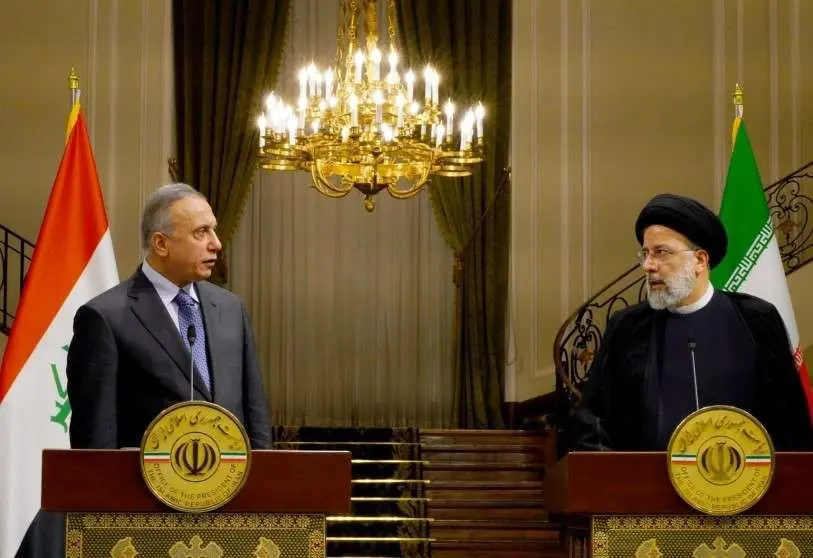Iraqi Prime Minister visits Iran and Saudi Arabia to revive talks between the two rivals

Iraq's interim Prime Minister Mustafa al-Kadhimi visited Saudi Arabia and Iran this weekend, seeking to revive talks between the two regional rivals after six years without diplomatic relations. These meetings come as the European Union and Iran try to unblock negotiations with the United States on a return to the nuclear deal.
On Sunday, Al-Kadhimi visited Tehran, officially to discuss bilateral and regional issues, meeting with President Ebrahim Raisi. "We have agreed to work together to stabilise and calm the regional situation," the Iraqi Prime Minister said at a press conference after the meeting.

Raisi, without referring directly to Riyadh, stressed the need for dialogue at the regional level. "We believe that talks between local authorities can solve the region's problems," said the cleric and now president. A day earlier, Al-Kadhimi travelled to Jeddah, where he met with Saudi Crown Prince and de facto ruler Mohammed bin Salman, with a similar agenda.
Al-Kadhimi has sought to maintain a balanced position between Iran and Saudi Arabia, and under his government Iraq has acted as a mediator between its two powerful neighbours. In this regard, since last year, Iranian and Saudi representatives have met several times in Baghdad to de-escalate the relationship, and this tour points to preparations for a new meeting.
The fifth round of negotiations in Baghdad took place in April this year, after Iran suspended the talks in response to Saudi Arabia's execution of 41 Shi'ites. Riyadh is now willing to continue diplomatic talks in Baghdad, according to Iranian Foreign Ministry spokesman Saeed Khatibzadeh, who spoke on Monday.

"There are still disagreements between Iran and Saudi Arabia, but they should be resolved between the two countries, which will help the entire Islamic world," the Iranian diplomat said, adding that the two countries had already reached an agreement on this year's pilgrimage to Mecca by citizens of the Persian country.
Riyadh and Tehran maintain a bilateral tension that has come to be described as a kind of Middle Eastern 'Cold War'. The two are on opposite sides in several of the region's major conflicts, from Yemen to Syria, and represent two opposing strands of Islam: Wahhabism and Shiism. The two regional powers severed diplomatic relations in 2016 after two Saudi diplomatic missions were stormed by Iranian protesters in response to Riyadh's execution of a Shia cleric.
But for months now both powers have been pointing to a thaw in their relationship. In this regard, the Saudi crown prince stated a few weeks ago that Iran and Saudi Arabia would be "neighbours forever" and should therefore seek a modus vivendi, while after being elected president, Raisi stressed that there was "no obstacle" that would prevent bilateral normalisation.

The day before Al-Kadhimi's visit, Josep Borrell travelled to Tehran to unblock the negotiations on the Iranian Nuclear Agreement. "I am happy to announce that after long meetings [...] we have managed to unblock the situation. In the next few days we will resume the negotiations that have been stalled for three months," declared the head of European diplomacy, specifying that Tehran and Washington would discuss under the mediation of Brussels in an alternative format in a Gulf country, beyond the Vienna meetings.
For his part, Iranian Foreign Minister Hossein Amir-Abdollahian declared on his Twitter account that a final agreement was within reach, "if the other parties have the will to conclude it".

The Iranian nuclear deal, formally known as the Joint Comprehensive Plan of Action, was concluded in 2015 in order to limit the Shiite country's nuclear programme to civilian technology in exchange for the removal of international sanctions. However, in 2018, the Trump administration abandoned the deal, reimposing sanctions on Iran and demanding concessions on its domestic and foreign policy, under a 'maximum pressure' campaign. A few months later, Tehran decided, in response, to stop complying with the deal and resume its nuclear programme.
Joe Biden's arrival in the White House seemed to signal a potential return to this treaty, but since then negotiations have moved slowly, and were paused three months ago following the US refusal to remove the Islamic Revolutionary Guard Corps from the State Department's list of terrorist organisations, a demand made by Tehran. Borrell now intends to revive the talks, trying to avoid a complete collapse.
A breakthrough in negotiations between Riyadh and Tehran could reduce the UK's opposition to the nuclear deal, and facilitate diplomatic efforts in this regard. Joe Biden, for his part, will visit Saudi Arabia next month, where he will meet for the first time since his arrival at the White House with Mohammed bin Salman, in a meeting where the two countries are expected to reach several agreements and put behind them the tensions of the last year over the murder of journalist Yamal Khashogyi.








